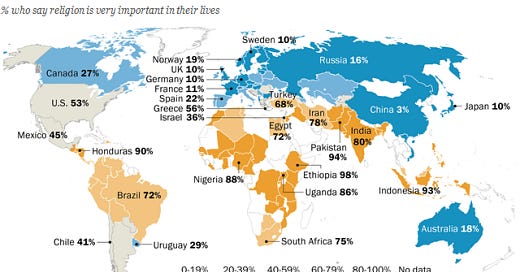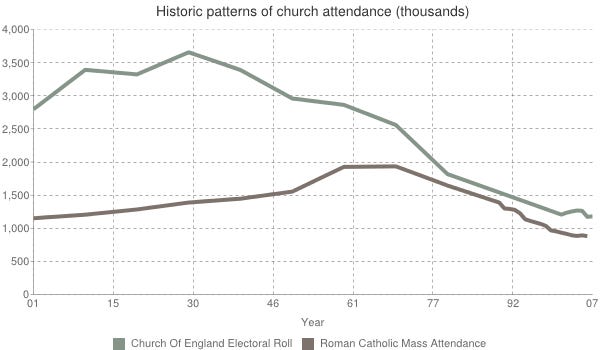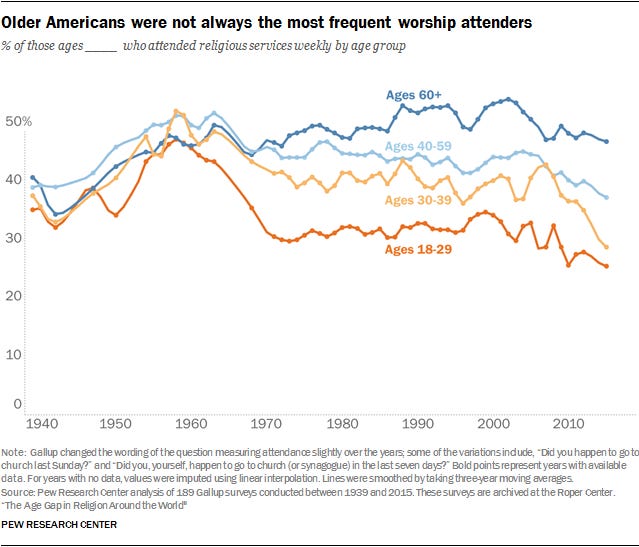The Romans built their temples on the sites of Ancient Briton temples. The Christians built their churches on the Roman temples. Now the churches are converted to offices, houses, halls and warehouses.
Religions are a way of life. Those who are passionate about religion cling tightly to the idea of God or gods but most people in religious countries go to church, temple or mosque once a week, say their prayers at the prescribed times and lead their lives within the bounds laid down in scripture. As new ways of life were imposed religion was the manual for how to lead the new life.
The religions created continents and countries with divergent cultures. The orderly peace of early twentieth century Britain was radically different from the clamour of Italy or France. The song of the muezzin in the sunny morning chill of Turkey was a continent away from the chatter around the tavli boards as Greek tavernas opened their doors.
In the late twentieth and early twenty first century the religions have been receding.
See Pew Research
The Marxists and then the Economists (who were inclined to Marxism) changed the world. The teachers took up the cause of secularism. In the UK the Anglican Church attendance has fallen steadily since 1930.
The graph above represents ardent church goers. Even as late as the 1990s many people considered themselves Christians and attended church occasionally but in the past 30 years there has been a dramatic decline in parents bringing up their children as Christians:
The Anglicans have lost the most adherents:
The loss of relevance of Anglicanism in the UK is probably due to the literalism of the most passionate clergy, they have forgotten that for most people religion is attractive as a way of life, not as a mystical cult. It should set the rules of social interaction.
The new secular world of the late twentieth and twenty first centuries is still in flux. The USA is still a bastion of protestant values although this is rapidly changing:
Wars dented religious observance in the early twentieth century but it was Marxism and education that caused the dramatic change in the 1970s and media secularism, with its stress on materialism as the meaning of life, that caused the fall in the noughties.
As with all the education related changes in society and politics it takes about 15-20 years for people to shake off the subtle indoctrination they receive at school and university. The 25 year old of 1970 became 60 years old in 2005. In 1970 28% of this cohort attended church but by 2005 46% were attending. The 60 year old is not more stupid than the 25 year old. Life has taught them the facts omitted by schooling. (Indeed the indoctrination supplied by schools is based on the omission of facts - like all successful bias, as BBC editors will tell you).
The modern secularism marks the rise of globalism. A global economic empire run by oligarchs (CEOs of major corporations, billionaires) is changing into a political empire and is throwing out the old tribal gods. This time the gods are being replaced with laws, surveillance and control of the media. Material power has become so complete that it is no longer necessary to embed a strong sense of social values in the population to achieve control. The new empire is ascendant and ultimately evil.
In the UK the victory over the old order is so complete that the population is entirely docile. It actually begs for more surveillance and elects governments that support the oligarchs whatever the personal conditions of the electorate. They could be unable to rent a house, need to visit food banks, witness the wholesale destruction of their landscape both rural and urban, have static or declining wages etc. yet still do as they are told by the mass media. The secular state has the same social power in 21st century England as the pope in 14th century England.
Most philosophers and religious sages over the millennia have told us that the object of human life is to be calm and content, to focus on things that are outside of our worries (our narratives) such as gods or philosophy. To regard our lusts and greeds as misleading at best. To love each other and our children, to respect our parents.
Most secular media outlets, including social media, convey the opposite message. According to the media meme humans are here to consume, perform and lust. This is driving the population insane, especially women.
Diversity is the jewel in the crown of humanity. The people walking around the Schwedagon Pagoda in Yangon are different from the people in the market of Chichicastenango who are different from the people of Plymouth or Mashad. The art and architecture is different, the religion is different and the family structures and societies are different. Sadly, even as you read this, the new imperium is sweeping away these differences.
The key driver of the new imperium is “diversity and inclusion”. The diversity of humanity is the result of millennia of division into separate tribes and empires, it is the opposite of inclusion. “Diversity and Inclusion” within each nation are doublespeak for “Uniformity and Subservience” on a global scale.
The British are under such strong control that most don’t realize that the focus on other cultures and the entirely negative treatment of British culture is about terminating the British. Modern multiculturalism is the gateway to national and global uniformity under the new empire.
Diverse systems are robust. Uniform systems are prone to failure. An area that grows a single crop could be devastated by a single storm or crop disease. A company that can only produce one product will be superseded and fail. Uniformity is a cultural “desert”. Once the new order has wrung the last contribution from the last tribe that it incorporates it will be a cultural desert until an unexpected event destroys it.
The imperium uses the indoctrinated young as its foot soldiers. Those who oppose it need to gain control of education and the media to save the world.








>The secular state has the same social power in 21st century England as the pope in 14th century England.
Good analogy that explains a reason for why State policies are justified as enforcing itself on private issues instead of public ones. This is expanded to Corporate policies too, like CEOs as you say.
The challenge is to convince the public that something -- or someone -- will regulate their private lives regardless. The West is freeing itself of the shackles of Christendom. OK great. At least Christianity had regulated life in public ways for the West. States and Corporations are also regulating lives but do it quietly.
Shaming of speech while claiming to be advocates of free speech is a current example. The online pornography laws in the US is the most recent example. Few US citizens are aware that the majority of US States have gradually ate away at adult content by enforcing real IDs while online (https://action.freespeechcoalition.com/age-verification-bills/) The observant citizen will recognize that these new laws aren't limited to conservative party politics. This example serves as a warning: regulation will move quietly, and when reported on will claim it acts for the public moral good, while infringing on citizen's privacy.
I'm shocked by these laws, not because they're about porn, but because using real IDs while online has been debated. The debate had sided with privacy concerns for decades. The times have shifted to enforce public moral good via secular State laws. How have State legislatures gotten away with this? If Pew were to poll Americans about porn, perhaps the majority now believe the State should regulate such morals. So despite the secular vacuum left in the wake of fewer pews full in Christian churches, the public is handing over moral regulation to the State. Instead of limited government, there will be more government. (That's just my guess based on the legislative action because I've not seen a poll.)
Corporations are also quietly enforcing their morals onto employees. Gone are the days of companies like Chik-fil-A publicly saying they're closed for business on Sundays because they're Christian. Now corporate social policies enforce the private actions of employees. My sister had an encounter with social policy. She was confronted by management about her desk not appearing to celebrate Black history month. Her reply was that she wanted to keep things professional, and had also chose to not celebrate other events at her desk, like Christmas. She felt shamed for staying impartial about celebrations at work, enough so that the told me the story, and left the company later on. I had a similar experience with a previous employer quietly pushing their social policy. A coworker asked me why my email signatures did not include my gender identity. The company had sent several templates that heavily encouraged gender language in emails to clients. I told my coworker that clients can simply call me by my name if they weren't sure about my gender. Nonetheless, I began to feel uncomfortable, and despite several years of service I left the company. Companies are now proudly aligning themselves with social policies, and these policies are enforcing a set of morals or at least a world view onto employees. The differences between a Church herding adherents towards social policies compared to a Company nudging employees towards another set of social policies are minor differences in my opinion. It's the same goal but done by different institutions.
>An area that grows a single crop could be devastated by a single storm or crop disease.
Another great analogy that I think also deserves literal interpretation. Globalization can be stopped by shifting our views about where and how we live. For example, local food webs of diverse crops that are locally adapted and resilient. The challenge with seasonally adjusted local food webs is that Western diets must change.